The evolution of Elmer the Patchwork Elephant
- Published
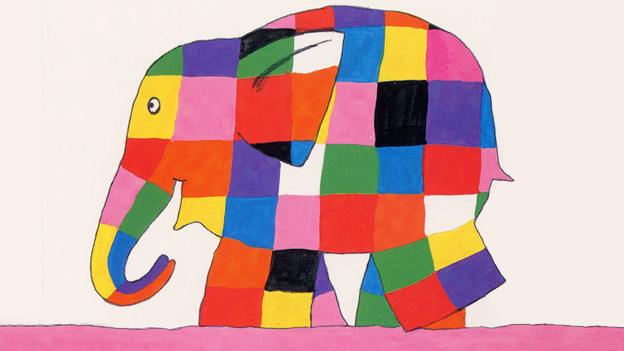
Elmer has starred in 22 books to date
Beloved by millions of pre-schoolers, Elmer the Elephant is showing no signs of a quarter-life crisis as he celebrates his 25th anniversary.
To see how the character has changed over the years, author David McKee talked us through five key illustrations from the patchwork pachyderm's pantheon.
1) The first Elmer - 1989
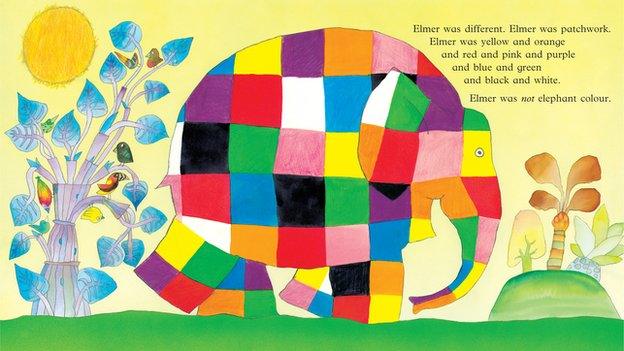
"This is the elephant from the first book and it's the first time we really see Elmer. We can see that the technique I used there is different. It's not just wash but I actually use crayon a bit over the colours. That's the one time that he appears huge like that.
"Why not a blue tree? Trees, if you look at them, you get all these different colours. And there's a tendency to have just blue sky and green trees which is very boring and it's not like life!
"I spent quite a bit of time in the south of France and some of the trees and plants you see there are so exotic."
2) Elmer on Stilts - 1993
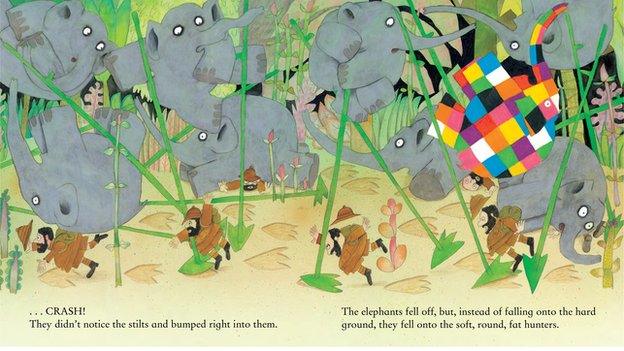
"It's the one book in which there are human beings. The story arose first when I was talking to a group of children and it wasn't an Elmer story to start with it was just about a hunter who'd actually saved the elephants. It turned out we could make it an Elmer book and have Elmer come up with the idea to use stilts to make monster footprints.
"I think it's a good story but it hasn't occurred since that I'd want people in an Elmer story."
3) Elmer and Wilbur - 1994
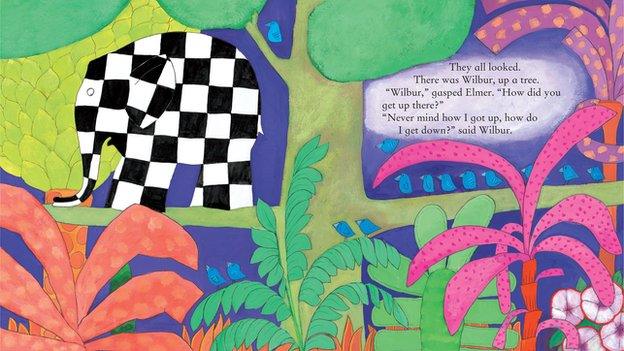
"By now we're into another technique - it's worked up in a different way, more opaque, not so transparent.
"Why an elephant up a tree? They say (in the story) 'How did he get up there?', but we never find out. I quite liked the idea of an elephant up a tree. It's a bit quirky and he's also a ventriloquist so I mean you're really in never-never land with that.
"The birds in this one don't have yellow beaks. They usually do, but the birds they give a bit more animation and detail to the pictures."
4) Elmer and Rose - 2005
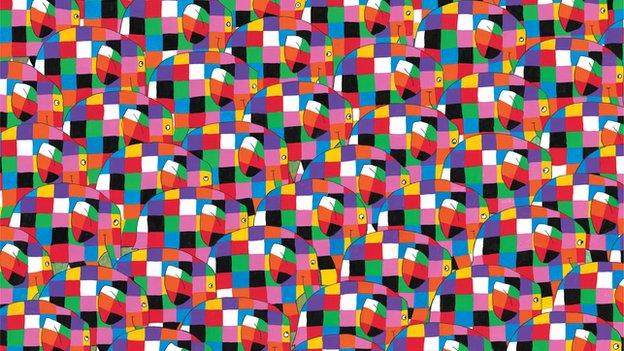
"I chose the end paper here because in this case the end paper is the final picture of the story. It's what Elmer is actually imagining. It was a complex picture to draw up and paint. Time consuming, one might say!
"They're doing an elephant bench of this one in Greenwich Park in London. I try to make the pattern and colours of the squares the same on each Elmer. I didn't used to be so strict and sometimes I make mistakes but that's unintentional.
"It doesn't bother me in the very early version I put the colours anywhere but I changed it a bit as if you've suddenly got three red (squares) together it doesn't work, but there was no real design to it."
5) Elmer's Special Day - 2009
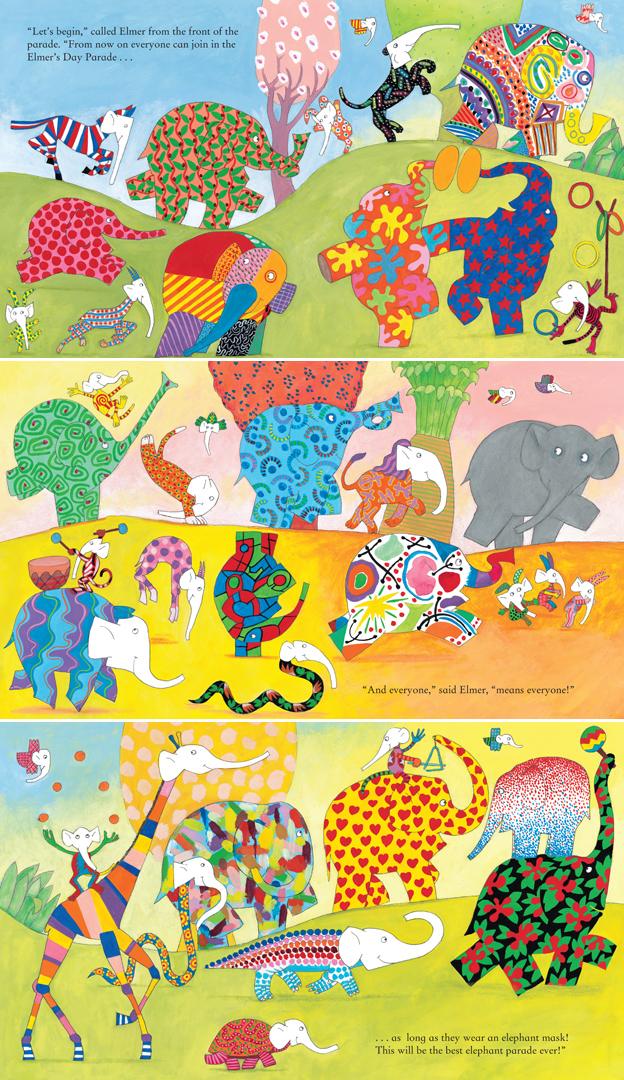
"This is an illustration that takes three pages. When I was doing this book I actually thought this might be the last Elmer I'd do. So it was quite a special book for me. It's just the way I felt at the time, I guess I was running into other things. So this does run over three pages and when I designed it, I did think it would be quite nice to print it and have it as a frieze.
"Some of these designs are based on the feel of other people's stuff, perhaps Miro. But I always liked this three page spread."

There are currently 22 Elmer books in print which have sold more than seven million copies worldwide.
The colourful character is so successful in Japan, he's even got his own clothing range marketed at adults.
"There are one or two pieces that are quite posh," smiles McKee, who says he finds the merchandise "flattering".
"If you see a child in a pushchair with an Elmer cuddly, I find that quite nice."
Inspired by the work of Swiss artist Paul Klee, McKee's first version of Elmer was originally published in 1968 before falling out of print.
"Once I had the image I got the name," remembers the author, "which was El, like elephant, and then it's like when you name a baby, they name themselves a bit."
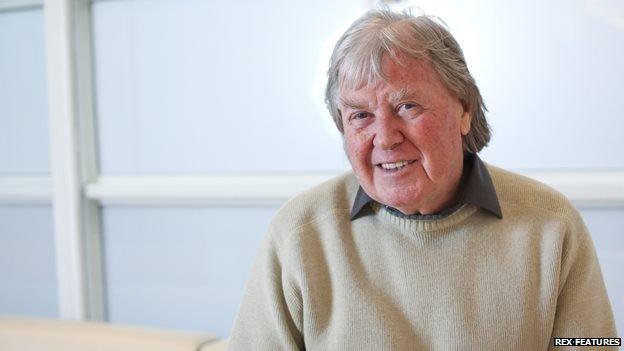
Born in Devon, McKee now spends most of his time in France
The elephant was resurrected and re-drawn in his current guise for Andersen Press, for whom he's been a big-seller since 1989.
"The one thing I've got against Elmer is he is inclined to kill off my other books," admits McKee.
"There are even booksellers that say 'We want David McKee's Elmer, we don't want the other titles,' you know?"
"Not Now, Bernard has had quite a success story but there are books like Charlotte's Piggy Bank which are complex books, which I would wish more of."
Elmer has been heralded as a LGBT hero for the recurring themes of acceptance that run throughout his books. McKee is keen to stress the stories are about championing "differences" and "not about colour and race".
The author admits the friendly elephant he created is probably a manifestation of himself, and Elmer's extended family is based on some of McKee's relatives;
"Wilbur is based on an uncle of mine who was a ventriloquist," he says. "I'd go for a walk with him and he'd talk to people that I couldn't see and they'd answer and it was wonderful!
"Aunt Zelda was based quite a bit on my mother and Super El came about because my grandsons would dress up as superheroes."
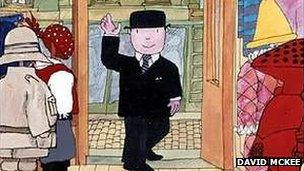
Some of McKee's other characters have made the transition to TV
To date, McKee, who also created the children's characters Mr Benn and King Rollo, has held firm on Elmer existing purely in the literary world.
"I've said 'no' to making films about Elmer," he confirms.
"A lot of people have asked and made offers and things but I'm quite happy with him just as books at the moment."
A 23rd Elmer title is currently in the works (Elmer and the Flood) but McKee wants his creation to live beyond his own years.
"Next birthday I'm 80, so I've already said to my three kids: 'After me, you do what you like but just read the small print!'"
And asked if there is anything Elmer would never do, McKee smiles: "Elmer would never smoke.
"He is quite correct but his sense of humour lets him be incorrect as well."